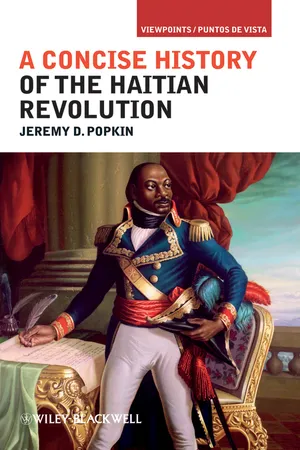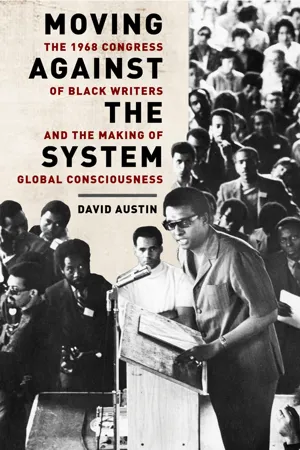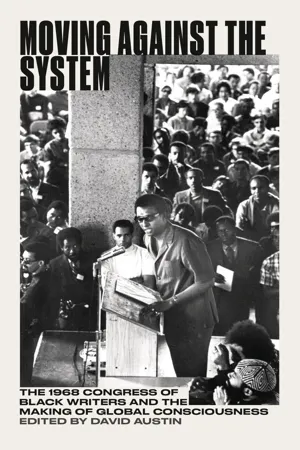Politics & International Relations
Haitian Revolution
The Haitian Revolution was a successful anti-slavery and anti-colonial insurrection that took place in the French colony of Saint-Domingue from 1791 to 1804. It resulted in the establishment of Haiti as the first independent black republic in the Americas and the only nation born out of a successful slave revolt. The revolution had a profound impact on the institution of slavery and inspired liberation movements worldwide.
Written by Perlego with AI-assistance
Related key terms
12 Key excerpts on "Haitian Revolution"
- eBook - ePub
The Roots and Consequences of Independence Wars
Conflicts That Changed World History
- Spencer C. Tucker(Author)
- 2018(Publication Date)
- ABC-CLIO(Publisher)
Haitian Revolution and Wars of Independence (1791–1804) CausesThe Republic of Haiti is a sovereign state on the island of Hispaniola in the Greater Antilles archipelago of the Caribbean just to the east of Cuba. Haiti shares the island with the Dominican Republic; Haiti comprises the western three-eighths of the island, while the Dominican Republic comprises the rest. Europeans first arrived in 1492 when Christopher Columbus, sailing for the Spanish Crown, stopped at the island that December, believing he had found Asia.Spain claimed possession of the island, which remained under Spanish control until the 17th century. The French established settlements in the western part of Hispaniola and on the island of Tortuga by 1659, and in the Treaty of Ryswick of 1697 that ended the War of the League of Augsburg (Nine Years’ War), Spain formally ceded to France control both of Tortuga and the western third of Hispaniola, now named Saint-Domingue.Saint-Domingue had a plantation economy based on slaves brought to the island from Africa. The island’s plantations produced coffee, cocoa, and indigo, but the main cash crop was sugarcane. The production of sugar made Saint-Domingue the most prosperous of France’s colonies and the wealthiest of all European colonies in the Caribbean. In 1789 it produced some 60 percent of the world’s coffee and 40 percent of the sugar imported by France and Britain. Under the French mercantilist system, Saint-Domingue was not permitted to develop its own industries and was forced to purchase finished goods from France, with all trade carried in French ships. Although many planters became fabulously wealthy, they also harbored resentment against the French government strictures.Haitian Revolution and Wars of Independence (1791–1804)Estimated Total Deaths, Haitian Revolution and Wars of Independence (1791–1804)*Black HaitiansFrench and British SoldiersWhite Colonists200,000 100,000 25,000 *Deaths from all causes. Scholars suspect that the majority of deaths were due to yellow fever. - eBook - ePub
The Expanding Blaze
How the American Revolution Ignited the World, 1775-1848
- Jonathan Israel(Author)
- 2017(Publication Date)
- Princeton University Press(Publisher)
CHAPTER 14 America and the Haitian Revolution Long regarded by white America as the most horrific and threatening of the revolutionary upheavals, the Haitian Revolution of 1791–1804 threw the entire Caribbean into turmoil and affected relations between whites and blacks throughout the New World for decades. This great eruption was not directly inspired or driven by the American Revolution but rather by the French; it powerfully interacted with developments in the United States, though, and impacted on the American Revolution’s legacy in a way that had enduring consequences for both the United States and Haiti, as well as profoundly changed the relationship between the United States and France. The Declaration of the Rights of Man and the Citizen, of August 1789, marked a new stage in the unfolding of the French Revolution and quickly injected a degree of social and political tension throughout the Caribbean, even though the white planters’ local assemblies in the French colonies for the moment remained sufficiently dominant to resist concrete changes in the islands’ institutions, laws, and caste system. During 1789–92, the ancien régime continued in the French Caribbean with only whites owning at least twenty-five black slaves being admitted to the island assemblies. Complete exclusion of free blacks from what some now considered to be their political rights, and their debarment from expressing their views, and from every public office and opportunity for upward mobility persisted without being directly challenged until the highly divisive five-month debate in the French National Assembly about the colonies and slavery that took place between May and September 1791 - eBook - ePub
The Early Haitian State and the Question of Political Legitimacy
American and British Representations of Haiti, 1804—1824
- James Forde(Author)
- 2020(Publication Date)
- Palgrave Macmillan(Publisher)
8 At times, however, American and British writers looked to impact the recognition question by overtly suggesting that the hand of political friendship should be offered to Haiti’s early leaders. But these depictions were also often designed to impact debates on the legitimacy and effectiveness of Atlantic world forms of governance—including America’s and Britain’s. In both critiques and celebrations of Haiti’s independence, the early Haitian state subsequently became a central entity in transatlantic debates on how political leadership should operate in the Atlantic world in the early nineteenth century.The enormous impact of the Haitian Revolution on American and British debates of slavery and its abolition has been well established. This impact continued in the immediate aftermath of the Revolution as newspapers, pamphlets and literary texts continued to portray the shocking violence perpetrated by French colonial forces and Haitian Revolutionaries, as well as the destructive nature of the Revolution for the colonists and the colony as a whole.9 The political messages underpinning these narratives were largely “bifurcated” as pro- and anti-slavery supporters on both sides of the Atlantic looked back on the events in Saint-Domingue as vital instruments for their respective campaigns.10 Anti-slavery supporters such as James Stephen and Thomas Clarkson saw the success of the black revolutionaries as proof that slaves in the colonies not only desired emancipation but also had the necessary capabilities to achieve it on their own terms.11 At such a crucial time in anti-slavery debates in Britain and America, abolitionists asserted the idea that if their respective governments did not act swiftly, a second Saint Domingue would inevitably occur in the British colonies or in the southern slave states of America.12 Pro-slavery supporters mirrored this strategy of the abolitionists by playing on a similar fear and asserting that this revolutionary spirit could spread beyond the newly formed Haitian state—something Ashli White has termed the “contagion of rebellion”.13 - eBook - ePub
The Haitian Revolution
Capitalism, Slavery and Counter-Modernity
- Eduardo Grüner, Ramsey McGlazer(Authors)
- 2019(Publication Date)
- Polity(Publisher)
République noire of Haiti in 1804: a republic formed by freed slaves, or rather by slaves who had freed themselves. This will allow me to analyze the characteristics of these movements more generally, while at the same time considering a particular and concrete historical case (though not, of course, just any case) of rebellion. Regrettably, I do not have sufficient space in this book to track Haiti’s unfortunate post-revolutionary history in detail, although I will occasionally gesture toward this history. In any case, however, this is not the main goal of my text. As I noted at the outset, I only wanted to fill a certain gap – an ideological and political and not merely “scientific” gap – that I perceived in much historical sociology and political theory in Latin America and the Caribbean.To this end, I will begin by offering a citation:In 1791, the colony of Saint-Domingue, established on the western half of the island which Columbus had named Hispaniola and which the native Amerindians (before their wholesale extermination by the Spanish) had called Hayti, was the richest and most productive French possession overseas, known as the Jewel of the Antilles. Plantations in the colony, run by slave labor, produced fortunes in sugar and coffee, which could create for their proprietors, who were frequently absentees, luxurious lives in Paris. From the point of view of French landowners, locally known as grand blancs, Saint-Domingue was not a place to settle permanently but a place to get rich quick.21This is how the North American writer and historian Madison Smartt Bell begins the preface to his monumental, three-volume historical novel about the Haitian Revolution. The novel’s beginning also serves as a good point of departure for us, since it offers, in a kind of establishing shot, a description of what Haiti represented on the eve of its great revolution. This description is necessarily schematic but not for all that unfitting. In another quick establishing shot, in the preface to the third volume in his trilogy, Bell provides a sketch of the broader political context in which the Haitian Revolution would unfold: - eBook - ePub
The Black Radical Tragic
Performance, Aesthetics, and the Unfinished Haitian Revolution
- Jeremy Matthew Glick(Author)
- 2016(Publication Date)
- NYU Press(Publisher)
Introduction The Haitian Revolution as Refusal and Reuse The cost of Americanization, of equality, is to forget. In black culture a narrative of antagonism is inscribed in its memory. Hortense Spillers To make a transition successfully, you need to be armed. Samuel R. Delany The Haitian Revolution is a grand refusal to forget. In defiance of our current conjuncture’s predilection for amnesia, Haiti as the first slave rebellion turned successful revolution (success defined here as the creation of a sovereign state) continues to be an inspired site of investigation for a remarkable range of artists and activist-intellectuals in the African Diaspora. Qualifying the Haitian Revolution as such assumes a particular set of understandings about firsts (the question of beginnings) and successes (the question of ends). Such assumptions merit interrogation, in other words, they are sites of and sites for critical thought. The plays and related objects of study examined in this book constitute staged repetitions of the Haitian Revolution. In our current political climate where revolutionary antecedents are, at best, shortchanged for their theoretical richness and, at worst, forgotten, Haiti brazenly insists on reminding. Radical historiography on the Haitian Revolution, chronicling its combative trials and tribulations, constitutes one of the most fecund, conceptually rich subfields in African diasporic studies. 1 Its heroes, its plotlines, and its military-strategic components continue to warrant novelistic, operatic, cinematic, and painterly attention. The following is an examination of twentieth-century theatrical production’s relationship to the political and methodological insights of the long nineteenth century’s Haitian Revolution from a tragic vantage point (tragedy as form and philosophical posture). It builds upon previous scholarship on C.L.R - eBook - ePub
Haitian History
New Perspectives
- Alyssa Sepinwall, Alyssa Goldstein Sepinwall(Authors)
- 2012(Publication Date)
- Routledge(Publisher)
The Haitian Revolution and the Revolutionary Generation of 1946 Matthew J. Smith DOI: 10.4324/9780203723814-11“1946 will be the year of freedom … Long live Democracy in action … Long live 1804!”1“The victory of the proletariat is the victory of us all … the hour is now for us to finally realize 1804.”2“Yes, this IS a revolution … 1804 was a revolution … and now 1946.”3“The Revolution of 7 January [1946] like that of 1804 was won by a large group … to defend the interests of the working class and the masses we should rally together as true militants who believe firmly in TOUSSAINT.”4Introduction
On January 11, 1946, Élie Lescot, the thirtieth Head of State of Haiti, fled the black republic into exile.5 Such events were nothing new in Haiti's troubled political history. Lescot's ouster had been the outcome of a five-day general strike precipitated by a left-wing student movement that drew inspiration from both communist and Black Nationalist ideologies. However, the revolutionary events of 1946 represented a first for Haiti and post World War II Latin America in the 1940s: a popular overthrow against a U.S.-supported dictatorship led by local radicals. In the months following the dramatic events in January, the black republic fell headlong into a fierce political debate that transformed the political history of the nation and introduced new ideologies into an already crowded political space. There were noteworthy developments: for the first time, a labor movement formed, the Haitian press gained unprecedented freedom with scores of radical newspapers sprouting up across the country, and Haitian Marxists, who were underground for over a decade, surfaced and presented a powerful challenge to the status quo.Most significant of these developments was the rise of a new classe politique, consisting in the main of young black radicals, who relied heavily on distinctions of class, colour, and experience to legitimize their new position. One of the central ideas of the young revolutionaries of 1946 was their responsibility to fulfill the historical promise of Toussaint and Dessalines; now blacks with little foreign interference could finally rule Haiti. Most of these men subscribed to the black power ideology of noirisme, which advocated total control of the state apparatus by black representatives of the popular classes. Where their nineteenth-century forebears had failed, the young noiristes of the forties argued, was in their inability to retain political power, which had traditionally been controlled by the light-skinned oligarchy. 1946 presented an unprecedented context for real political change in Haiti, as the exploits of mulâtre - eBook - ePub
- Jeremy D. Popkin(Author)
- 2011(Publication Date)
- Wiley-Blackwell(Publisher)
bossales must have become blurred as they all participated together in the fighting and suffered together at the hands of the French. Dessalines’s insistence, in his 1805 constitution, that all Haitians, regardless of origin or skin color, now formed a single group reflected a certain reality: the revolution had forged a new national community, although not one as united as Dessalines had hoped.Despite the profound significance of the events of 1804 and 1805, not just for the people of the newly proclaimed nation of Haiti but for the entire western world, it would be a mistake to think that the story of the Haitian Revolution ended with the victory over the French and the establishment of new “imagined community” of Haitian citizens.2 Not until the middle of the nineteenth century was it clear what the lasting characteristics of Haitian society and politics would look like. Conflict over the country’s future direction soon became so violent that Dessalines, the determined general who had defeated the French, was assassinated. For fourteen years, from the beginning of 1807 to 1820, Haiti split apart, as the divisions between blacks and free men of color and between the northern and southern regions reasserted themselves in a simmering civil war. Instead of becoming one independent state, Haiti might well have developed into two rival countries.Internal divisions were not the only threat to the future of the experiment launched in 1804. Despite the conclusiveness of the French defeat, few whites at the time believed that a society governed by people of African ancestry could endure; most assumed that it was just a matter of time before some outside power succeeded in reasserting control over the island. France, Haiti’s former colonial overlord, refused to recognize the new country’s independence, and former colonists and government officials there continued to discuss plans to reoccupy the territory for several decades after the independence declaration of 1804. In the meantime, the Spanish and Portuguese colonies in central and South America followed Haiti’s lead in demanding their own independence, but, like the United States, they refused to recognize the black-ruled island as an equal partner in the new world of independent states that now made up the Americas. Disadvantaged by structural changes in the world economy that doomed any hope of recovering the prosperity of the colonial past, and marginalized by the rising tide of racialist prejudice that characterized the nineteenth century, Haiti found itself condemned to a precarious existence from which, many would argue, it has never really been able to escape. - eBook - ePub
Moving Against the System
The 1968 Congress of Black Writers and the Making of Global Consciousness
- David Austin(Author)
- 2022(Publication Date)
- Between the Lines(Publisher)
Chapter 2The Haitian Revolution and the History of Slave Revolt
C. L. R. JamesThank you, Mr. Chairman. Now, I like to know for myself, and I mention it to you in passing, the time now I take to be five minutes to four o’clock. I will be finished at twenty-five or twenty to five, when the questions begin. I don’t want to speak longer than about forty to forty-five minutes.The history of the Haitian Revolution is not a difficult subject for me to do within a certain time. But, on this occasion, we have to take the Haitian Revolution as symbolic of the whole series of revolts of black people in the New World. That’s what I’m going to do. I’m going to begin with the Haitian Revolution and after that I’m going to spend some time on the Civil War in the United States. There, again, we have black people, black slaves, moving into a great historical situation.But before I do that, I want to say a few words about the Cuban Revolution, because the Haitian slave revolt was a revolt in a West Indian island of a certain social structure. Cuba is of the same kind and the Haitian Revolution has many affiliations with the Cuban Revolution. So, I will begin with the Cuban Revolution, then I will go to the Haitian Revolution; then I will go to the Civil War in the United States, and then I’ll go somewhere, which you will know when I tell you. I’m going to keep that a secret and I hope you will be pleasantly titillated. [Laughter]Now, the Cuban Revolution takes place in the twentieth century. It is the twentieth-century representative of what had taken place previously in French San Domingo at the end of the eighteenth century. The two revolutions are very closely allied. It is not so much a question of race or colour. That is what I want to emphasize. There will be, perhaps, a third of the population of Cuba which is coloured. The point is they are both West Indian communities; both are sugar plantation communities; both are, to some degree, communities that, while not advanced, nevertheless are built in the structure of Western civilization. Although many of them, many of the population in those parts of the world, are living at a level very little above the level of slavery, in social structure and, above all, in the language that they use, they have a European cast of mind. That is why the Cuban Revolution has taken place in the way that it has. That is another reason why it has not yet taken place in many of the other West Indian islands; because, among other reasons, if and when it does take place, it will take place along the structure of the Haitian Revolution and the Cuban Revolution. - eBook - ePub
Practices of Resistance in the Caribbean
Narratives, Aesthetics and Politics
- Wiebke Beushausen, Miriam Brandel, Joseph Farquharson, Marius Littschwager, Annika McPherson, Julia Roth(Authors)
- 2018(Publication Date)
- Routledge(Publisher)
He argues that the different references to the contradictory and violent past of Haiti from both external and internal viewpoints are a constitutive factor of Haitian culture and identity. Eser starts from the premise that “[t]he most salient historical event of Haitian history can be traced back to the revolution of enslaved people in 1791, a process of political resistance and emancipation, which, in 1804, led to independence and the constitution of the Haitian state” and stresses that the event continues to be an important historical point of reference which is highly charged with symbolic value. In his contribution, he looks at different imagologies of Haiti and provides a concise overview of the diverse cultural and political meanings that have been and continue to be attached to the Haitian Revolution on the international level, in the inner-Haitian debate on the subject, and in fictional, artistic discourses. Drawing on Walter Benjamin’s concept of the ‘dialectical image,’ Eser compares and contrasts these different “registers of knowledge” and perspectives on the Haitian Revolution with recent debates and discourses in and of Haiti through an investigation of the importance of the cultural legacy of the Haitian Revolution and its contemporary usage in Haitian society and culture - eBook - ePub
Moving Against the System
The 1968 Congress of Black Writers and the Making of Global Consciousness
- David Austin, David Austin(Authors)
- 2018(Publication Date)
- Pluto Press(Publisher)
Chapter 2
THE HAITIANREVOLUTION ANDTHE HISTORY OFSLAVE REVOLT
C. L. R. JAMEST HANK YOU , Mr. Chairman. Now, I like to know for myself, and I mention it to you in passing, the time now I take to be five minutes to four o’clock. I will be finished at twenty-five or twenty to five, when the questions begin. I don’t want to speak longer than about forty to forty-five minutes.The history of the Haitian Revolution is not a difficult subject for me to do within a certain time. But, on this occasion, we have to take the Haitian Revolution as symbolic of the whole series of revolts of black people in the New World. That’s what I’m going to do. I’m going to begin with the Haitian Revolution and after that I’m going to spend some time on the Civil War in the United States. There, again, we have black people, black slaves, moving into a great historical situation.But before I do that, I want to say a few words about the Cuban Revolution, because the Haitian slave revolt was a revolt in a West Indian island of a certain social structure. Cuba is of the same kind and the Haitian Revolution has many affiliations with the Cuban Revolution. So, I will begin with the Cuban Revolution, then I will go to the Haitian Revolution; then I will go to the Civil War in the United States, and then I’ll go somewhere, which you will know when I tell you. I’m going to keep that a secret and I hope you will be pleasantly titillated. [Laughter ]Now, the Cuban Revolution takes place in the twentieth century. It is the twentieth-century representative of what had taken place previously in French San Domingo at the end of the eighteenth century. The two revolutions are very closely allied. It is not so much a question of race or colour. That is what I want to emphasize. There will be, perhaps, a third of the population of Cuba which is coloured. The point is they are both West Indian communities; both are sugar plantation communities; both are, to some degree, communities that, while not advanced, nevertheless are built in the structure of Western civilization. Although many of them, many of the population in those parts of the world, are living at a level very little above the level of slavery, in social structure and, above all, in the language that they use, they have a European cast of mind. That is why the Cuban Revolution has taken place in the way that it has. That is another reason why it has not yet taken place in many of the other West Indian islands; because, among other reasons, if and when it does take place, it will take place along the structure of the Haitian Revolution and the Cuban Revolution. - Jeb Sprague(Author)
- 2012(Publication Date)
- Monthly Review Press(Publisher)
1. A History of Political Violence Against the PoorThe historical roots of systematic political violence by dominant groups targeting people in the Caribbean region can be traced back centuries.1 The indigenous peoples, inhabitants of the region for at least 5,000 years, were almost completely decimated just fifty years after Christopher Columbus landed in 1492 on the island he dubbed Hispañola. In 1697, the western part of the island became a French possession called Saint Domingue, and the eastern section was named Santo Domingo and stayed under the Spanish crown. During the next century, Saint Domingue, known as Haiti since independence in 1804, became one of the richest colonies of any European empire.2 By the late eighteenth century, it had become the “Pearl of the Antilles,” and the most lucrative center of slave trade in the world, with around half a million slaves in the colony.3 The slaves spoke many different languages, since they had been kidnapped from various parts of Africa (mostly West Africa). To communicate, they eventually forged a distinctive language (Kreyòl) and religion (Vodou).Not long after the French Revolution began in 1789, the new revolutionary government was petitioned to extend citizenship to the population of nearly 30,000 free descendants of slaves. The Estates General’s decree of May 15, 1791, gave full citizenship to a section of the property-owning free blacks (however, it was geared toward the mulattos, persons of mixed black and white ancestry).4 This angered many whites in the colony, and skirmishes soon broke out between different sectors of the non-slave population. Word of the reform also spread to Saint Domingue’s slaves, who made up most of the colony’s population.In August 1791, slaves from the northern plains of the French colony met in a wooded clearing, Bois Caiman, just south of Cap-Français (which had previously served as the colony’s capital) and what today is the city of Cap-Haïtien. During a spiritual ceremony, a slave leader and vodou priest, Boukman Dutty, called a meeting to plan a revolt. Unwilling to live under the brutal conditions of slavery, blacks in Saint Dominigue began a revolution, which lasted from 1791 to 1804 and cost the lives of about 160,000 slaves, 60,000 French soldiers, and up to 50,000 English soldiers.5 The famed author C. L. R. James in his grand opus, The Black Jacobins , explains that the key revolutionary leader for the slaves was Toussaint L’Ouverture, even though he died a year before the slaves defeated the French.6- eBook - ePub
Haiti's New Dictatorship
The Coup, the Earthquake and the UN Occupation
- Justin Podur(Author)
- 2012(Publication Date)
- Pluto Press(Publisher)
1 HISTORICAL CONTEXTHaiti in the Americas from independence to today
Before starting the analysis of the post-2004 period, some historical context is necessary. Most books on Haiti include a short overview of the past, and there are several good histories. This background will emphasize the aspects of history that are important for understanding recent history: specifically, the constraints on Haiti’s economic and political sovereignty, imposed from the outside.HAITI IN THE COLONIAL PERIODWith the Dominican Republic, Haiti is one of two countries on the island of Hispaniola, whose indigenous inhabitants came into contact with Europeans in 1492 with Christopher Columbus’s first voyage to the Americas. Columbus left a settlement behind, and the devastation of the indigenous population through brutal violence, forced labour, and disease began immediately.1 Over the following century, the indigenous population of many of the new Spanish colonies was wiped out, reducing the forced labour pool accordingly. The Spanish then introduced African slaves in Hispaniola, as they did in Cuba and other colonies. Haiti was thus one of the first terminal destinations for the captured men and women of the transatlantic slave trade.In the sixteenth and seventeenth centuries, European colonial powers, including Spain, the Netherlands, England, and France, fought naval battles directly and through proxies (pirates) for colonial possessions in the Americas. The Caribbean was the major site of these conflicts. France began to settle colonists in western Hispaniola in the seventeenth century, and by the end of that century the Spanish ceded the western part of Hispaniola to the French, who named the colony St Domingue.St Domingue became France’s most important colony and a major source of its wealth. St Domingue’s wealth was from a variety of export crops, especially sugar and coffee, but also tobacco, cocoa, cotton, indigo, and others, produced with slave labour for European markets. In the eighteenth century the colonial capital, Port-au-Prince, was destroyed twice by major earthquakes, once in 1751 and again in 1770. By the late eighteenth century, the slave population was far higher than the white population. The slaves’ resistance was constant and, in various ways, successful: they raided plantations, freed others, and, like slaves in Brazil, Colombia, elsewhere in the Caribbean, and the United States, they founded maroon societies of escaped slaves. The history of slavery and of resistance continues to have a powerful resonance in Haiti’s culture today.
Index pages curate the most relevant extracts from our library of academic textbooks. They’ve been created using an in-house natural language model (NLM), each adding context and meaning to key research topics.











